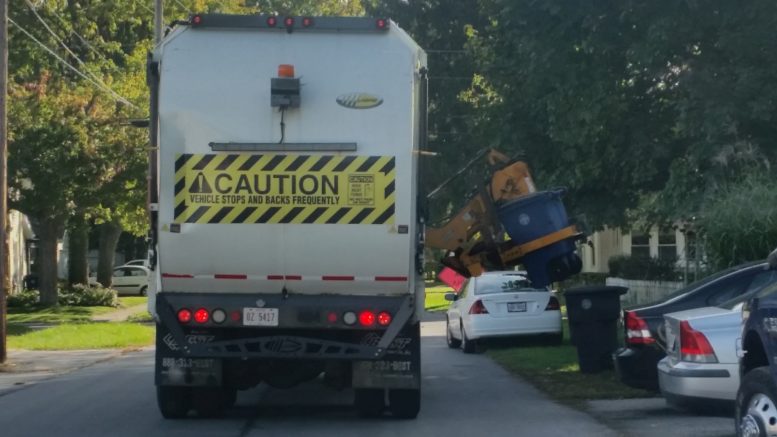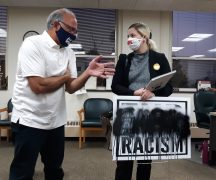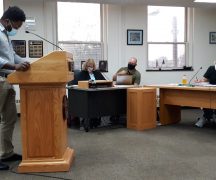By JAN LARSON McLAUGHLIN
BG Independent News
Starting in January, city residents will start paying $13 a month to have their trash and recyclables hauled away.
Bowling Green City Council’s Committee of the Whole got a first look at the new fee proposal Monday evening from Municipal Administrator Lori Tretter. The trash and recyclable fee was chosen earlier this year by council as the least objectionable option for building up a general fund that is losing money due to state cuts.
Citizens wanted to stick with the city collection program, rather than bringing in a private contractor. So the city opted to start charging for the service.
The fees are intended to raise $800,000 for the general fund that has taken several hits from state and federal cuts. The trend does not appear to be turning, with the most recent state biennial budget cutting $65,000 more in Local Government Funds cuts to the city.
So here are the basics of the new garbage and recyclables fee proposal:
- How much will it cost – $13 a month for one refuse container and one recycling container per household. An additional $5 a month will be charged for each additional container.
- Who will pay – Citizens living in one- and two-family dwellings who currently have city pickup services, plus any new homes that are built in city. Apartment buildings are served by private garbage pickups.
- When will fees start – January of 2018.
- How will people be charged – Fees will be added to monthly utility bills.
- Can citizens opt out of the service and the fee – No. People who live in an eligible dwelling must pay the fee. Many of the city’s costs are fixed, such as staffing, trucks, fuel and maintenance. Plus the city would like uniformity in trash receptacles and timing of pickups – which would not exist if households contracted with private haulers.
- Can people suspend service for a portion of the year – No. Again, many of the costs are fixed, and the city incurs them regardless if a container is curbside or not.
- Where will the money go – The city’s general fund will get $800,000. Any additional money will go to the capital improvement fund to be used for recycling/refuse vehicles. There are currently five vehicles costing about $250,000 each with expected life spans of 10 years.
- Other changes proposed for brush and large item pickups – Brush pickup will not be a certain week, but instead based on when residents call to request. Each home will be allowed one pickup a month during April, May, September and October. Citizens can call and request large item pickups, which will be scheduled twice a week all year. The first two pickups from a residence a year are free.
The city is also proposing that a new position of sustainability coordinator be created, with the costs shared with the utility department. The coordinator would be responsible for education and identification of new ways the city and community can reduce waste and use resources more efficiently.
The city’s recycling rate is currently 28.85 percent of the waste stream – lower than the national average of 34 percent. The sustainability coordinator would work on increasing that rate, educating citizens, applying for grants, and improving operations, Tretter said.
On the utility side, the coordinator would work on stormwater management.
“We think this is another way for the city to become more sustainable,” Tretter said. “We don’t have the current staff to do that. We need help.”
The plan addresses brush and large item pickups, but not the annual leaf pickups, council member Bruce Jeffers pointed out. Tretter said the new coordinator would look at the possibility of moving toward promoting mulching in the community.
Council member Sandy Rowland said she was supportive of more education to help reduce waste. She asked about the idea of rewarding residents for recycling more and creating less garbage to be landfilled.
“There’s nothing like a financial incentive to get people to act,” Rowland said.
Tretter said the new coordinator will be charged with looking at ways to incentivize people to landfill less. The city looked at the “pay as you throw” concept, but decided it would not work for Bowling Green because the city currently has no way to weigh the garbage as it is being lifted into the truck. Most “pay as you throw” programs are operated in cities that use garbage bags rather than the containers that can be lifted with the automated arms on trucks.
Council member Daniel Gordon said residents would like to pay less if they generate less trash. “A great deal of residents want us to structure this so if they don’t generate a lot of waste,” they can pay less.
But Tretter again stressed that the city has fixed costs that have to be paid whether a trash container is full or not.
Council president Mike Aspacher asked about an opt out program for residents who aren’t in the city for extended periods each year.
But Tretter defended the decision to not let residents opt out of the city’s garbage and recycling pickup.
“At first glance, that may seem unreasonable,” she said. But she listed consistency and the city’s fixed costs as reasons that every residence should pay.
Council member John Zanfardino asked about the possibility of continuing recycling pickups weekly, but cutting garbage pickups to twice a month – as a way to promote less waste generation and cut costs.
But council member Bob McOmber said that could pose a problem for some residents. “I’m concerned. Some people fill up that can every week.”
Zanfardino asked about people being charged only if they put their trash out each week. “Are we able to do that kind of a count as they go?”
Tretter said that would be very difficult for the trash crews. “Having to stop and enter things would impede the operation,” she said.
McOmber called the fee plan a “solid proposal,” with $13 a month being toward the lower end of amounts charged in other area communities.
Discussions will continue on the program, and Aspacher urged citizens to contact their council members with concerns.





